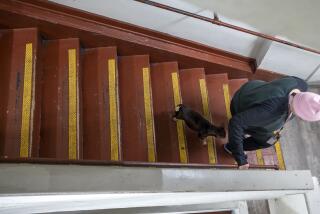Q&A: Is a homeowners association liable when it rents space to a commercial tenant?
- Share via
Question: Last month I had a business meeting at a café in the Long Beach area. I ordered something very simple to eat, macaroni and cheese. As luck would have it, I bit into an uncooked macaroni pasta shell that sliced through my gums, necessitating stitches. One of the lawyers I was dining with suggested suing the café for damages and reimbursement.
At the time of purchase the cashier asked me if I wanted a receipt, but I said it wasn’t necessary and paid with cash. Later I learned that the café’s owner is an independent company leasing the commercial unit from a homeowner association. After some sleuthing, I also learned he apparently shares a percentage of his profits with the association. Who do I sue?
Answer: Your injuries arise from a transaction with the café, so if you decide to sue you should sue the café owner directly. Without a copy of your receipt it may be difficult to prove your purchase and resulting harm, but the lawyer you were eating with should be able to corroborate your story. There also may be surveillance video of your presence and the transaction itself.
The café’s relationship to a homeowner association is most likely immaterial to your claim, which could stem from negligence in the handling and preparation of your meal. In most circumstances an independent company that rents space from an association is no different than an independent company that rents space from any other landlord.
For the association to be responsible for your injuries, even partially, there must be some special relationship between the two entities. Otherwise, it would be unreasonable for the association to share in any potential liability from the operation of the café.
The fact that the two entities share a percentage of profits may not be enough to impute liability on the association. While the sharing of profits is an indication of a closer legal relationship than mere landlord-tenant, there typically must also be some degree of control exercised by the association over the business of the café to extend liability.
Start by making a written demand for settlement on the café and its owner for your damages. If that proves unsuccessful, you can file a lawsuit against the café. During the discovery process you will be better able to determine the extent of the relationship between the cafe and association. If you are able to add the association as a defendant, you would increase your potential pool of recovery for any damages.
Zachary Levine, a partner at Wolk & Levine, a business and intellectual property law firm, co-wrote this column. Vanitzian is an arbitrator and mediator. Send questions to Donie Vanitzian, JD, P.O. Box 10490, Marina del Rey, CA 90295 ornoexit@mindspring.com
More to Read
Inside the business of entertainment
The Wide Shot brings you news, analysis and insights on everything from streaming wars to production — and what it all means for the future.
You may occasionally receive promotional content from the Los Angeles Times.










